Modern Horror Series : It Follows
It’s Behind You
Released : February 27th 2015
Certificate : 15
Director : David Robert Mitchell
Cast : Maika Monroe, Daniel Zovatto, Keir Gilchrist, Jake Weary, Lili Sepe, Olivia Luccardi
Plot : After an innocent sexual encounter, teenager Jay (Monroe) is told by her partner that he has passed on to her an odd curse, in which she will be followed by an entity.
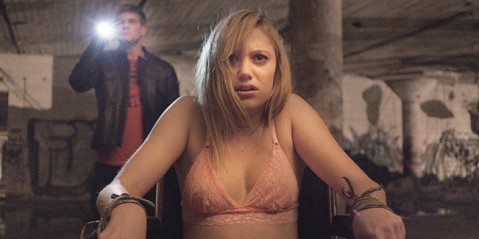 2014 was a big year for modern horror, with three standouts gaining big critical (although not box office) success. Those being, A Girl Walks Home Alone at Night, It Follows and The Babadook. It is rare, given the amount that fly under the radar, for a horror film to be praised by critics, and each of these films was for very different reasons. It Follows got noticed for both its indie vibe as well as its retro feel and setting, with homage paid to both the set design of the classic 1970’s slasher horror film as well as the style of filming. Directed and written by David Robert Mitchell (a filmmaker famous for little else) made a unique film, not only for the reasons listed, but also for the ‘monster’ of the film as well as the imagery that is used.
2014 was a big year for modern horror, with three standouts gaining big critical (although not box office) success. Those being, A Girl Walks Home Alone at Night, It Follows and The Babadook. It is rare, given the amount that fly under the radar, for a horror film to be praised by critics, and each of these films was for very different reasons. It Follows got noticed for both its indie vibe as well as its retro feel and setting, with homage paid to both the set design of the classic 1970’s slasher horror film as well as the style of filming. Directed and written by David Robert Mitchell (a filmmaker famous for little else) made a unique film, not only for the reasons listed, but also for the ‘monster’ of the film as well as the imagery that is used.
It Follow is full of imagery and style the reference many classic films, Halloween being a standout. While the directing is unique from Mitchell, the music score, the 70’s setting, the blonde and other aspects all reminisce of the classic horror film. From just this alone, it becomes clear that some a lot of thought has gone into the film from Mitchell’s end. Just as Carpenter in Halloween introduced the use of in depth and out of depth and movement in the corner of the frame into the horror genre, Mitchell plays with it both in his directing as well as pure nature of his monster (an anonymous being that audiences scan the frame to spot in scenes). The way the film has a close nit set of friends who are young and deal with the issue also brings in elements of many 70’s and 80’s classics. The imagery that Mitchell uses as well, although may be obvious and clear in meaning, are enjoyable to have present as it is rare that a director in this genre takes the time with such qualities. What all this amounts to, and is clear from the very opening sequence of the film, is that Mitchell is very skilled director who has thought out this little project of his very well.
Due to such skill, It Follows was able to create genuine scares without the use of much blood or a monster as such. This is a very rare feature of horror films, where the way in which a scene is presented, rather than what is being presented create more of the scares in the film. It was a quality achieved in Halloween, as it was just a man in a mask, and is again done so here, as it just a person following you. So above all else, It Follows was elevated to the level of prestige that it was due to its directing. As to the storyline, which the imagery suggests, there is a theme of innocence, and the loss of it that come with growing older. While the film doesn’t attempt to make a bold point about this topic, in horror films this is something that is repeated. In the slasher films revolving around teenagers, the sexually active ones are killed off first, and It Follows seems to play off this convention as its main theme.
It Follows isn’t a horror film for everyone for the following reasons. Not every horror film fan will appreciate the directional choices such as the imagery and the intertextuality that takes place. Also the story structure, which is basic on dialogue and characters, and could be labelled as repetitive at times as that characters continuously run away from ‘the following’, may result in a bore for some. But for people who appreciate the artistic craft and execution over a flasher ‘fun’ blood feast, they will have a very special time.
Verdict : A very unique horror film which has a great level of freshness to both its story and directing, providing genuine scares and a great atmosphere throughout.
Verdict : 4/5
Quote : “It could look like someone you know or it could be a stranger in a crowd. Whatever helps it get close to you.”
Modern Horror Series : Howl (2015)
British Werewolf on a British Train
Released : October 16th 2015
Certificate : 18
Director : Paul Hyett
Cast : Ed Speleers, Holly Weston, Elliot Cowan, Sam Gittins
Plot : A late-night train breaks down in a wood, where a werewolf circles.
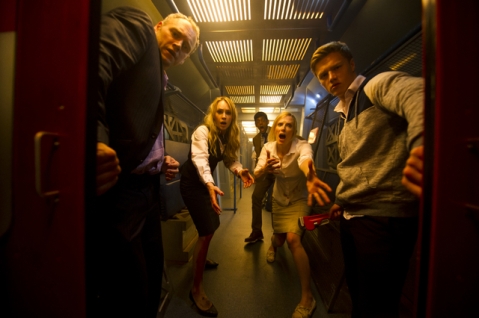 This is one of the most conventional horror films around in recent years, a straight to DVD film about people being eaten by werewolves on a train. These films have always been the bottom of the pile for the horror genre, but it recent years especially there has been a huge surge in the amount of moderate budget horror created. Most of which doesn’t make it to cinemas and is lucky if it gets a spot-on television. But out of this vast abyss of corny horror films, Howl managed to scrape a 70% on Rotten Tomatoes, miles ahead of most of ‘these’ film types.
This is one of the most conventional horror films around in recent years, a straight to DVD film about people being eaten by werewolves on a train. These films have always been the bottom of the pile for the horror genre, but it recent years especially there has been a huge surge in the amount of moderate budget horror created. Most of which doesn’t make it to cinemas and is lucky if it gets a spot-on television. But out of this vast abyss of corny horror films, Howl managed to scrape a 70% on Rotten Tomatoes, miles ahead of most of ‘these’ film types.
First off, as with these generic horror films, they are extremely predictable and Howl is no exception. You can guess the people which will die early on within seconds of them being on screen. The biggest reveal this film has to offer is the surprise that there is more than one werewolf. Also, these films rarely have imagination to the direction, with the age-old point of view shots from the creature’s looking at the victims through the woods. Howl fits with this as well, with Hyett (Howl being his most famous picture) using his fair share of the troops. The acting as well will be often, terrible, Howl manages to maintain a mostly acceptable level across the board. And the writing could have been done by anyone, with characters making the poorest decisions and character archetypes of the genre being used fully. But surprisingly Howl manages to be an entertaining film, as when a film fits these conventions like a glove to a well-executed standard, and has enough budget in the special effects department, it can be irresistible.
The horror genre is one of the most successful genre at creating bad films, which make a good time. The film’s enjoyment can be mirrored by the style behind of special effects. When you finally see the beast, it is so over the top and borderline laughable, that you simply suspend all rational thoughts other than to just be entertained by the carnage. There is something extremely entertaining about a film which executes this style with fair levels of skill, harking back to the genre’s early years such as Friday the 13th. Films which knew that the sole pleasure that they offered was the thrills, chills and laughs and watching one character at a time being gruesomely dismembered. This is exactly what is offered by Howl, and the only aspect that makes it work is plenty of action and predictability and solid special effects department. The reveal scene of the first werewolf in all its glory comes unfortunately late in the film, but as you can see when you google the film, is such an odd spectacle that it’s just enjoyable.
It’s very easy to be critical of films like this, and any criticism that are made could be just as easy applied to any straight to DVD horror film that came out in the last 10 years. The only unique criticism that could be thrown at Howl is that the werewolves, don’t look like wolves. But this film can serve as a great guilty pleasure film, if the mood is right you can relish the violence and the cliché nature of the film type. So, Howl manages to separate itself from ‘the rest’ by the following. All the clichés are meet, which would usually be a drag but when they are done in such a (overall) visually well executed manor, with a great batch of monster to boot it offers great fun. Most likely the film isn’t worth by many people’s standards the price stage of the Blue-ray copy, but it’s a good bonus as well.
Verdict : Have fun in watching an classic style of horror film executed just as badly as all the rest. But with a lot of blood and hilarious monsters it’s a fun guilty pleasure.
Verdict : 3/5
Quote : “Bear’s don’t Howl”
The Gift DVD Review
Couple Retreat
Released : August 7th 2015
Certificate : 15
Director : Joel Edgerton
Cast : Rebecca Hall, Joel Edgerton, Jason Bateman
Plot : Childless married couple, Simon (Bateman) and Robyn (Hall), with a bumpy past move into a lavish new house in a new city for a fresh start. Upon arriving Simon is approached by Gordo (Edgerton), a high school friend of Simon. Gordo’s persistent attempts to become friends is uncomfortable and soon leads to dark waters.
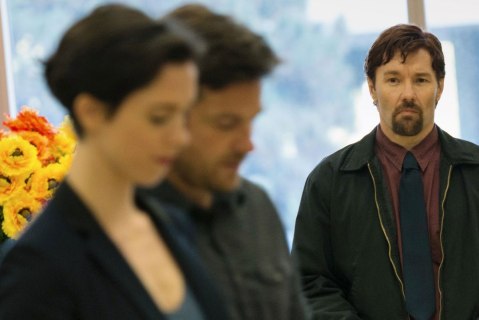
The Gift is first feature length film to be directed by Joel Edgerton, and first written film in the sense that it’s his first feature length film that he hasn’t adapted from other material. Edgerton has had a limited acting career (in the sense of mainstream success), but since his arrival has turned out some critically praised performances, most famous for his lead role in Warrior, and more recently a supporting role in Black Mass. As well as Edgerton going into new water, Bateman is a lead who has the famously comedic runaway star of Arrested Development, how has had limited success with his ventures into drama grounds, with the films being little acknowledge in the mainstream and receiving modest critical praise (the films not Bateman). Hall is most at home within the genre, after her famous turn in The Awakening has proven herself a worthy thriller component. As a writing and directing debut, it gives a good insight into the tone and style the Edgerton could be taking with his future career outside of acting. Here we have a twisting, jarring thriller about one man’s friendly yet sinister relationship with a couple. With a limited cast and restricted setting of story, there’s little to distract from Edgerton three components in this film.
To open by addressing his storyline, it’s a patchy piece of brilliance, with a conflicting amount of falls and success. The film has a mostly fresh and exciting concept, which devolves issue with its deliverance with a slight issue of pacing. Reaching the end of the film, it falls into a bad trap of feeling slightly too long, the reason for which can be spotted easily. The middle act of the film is slightly extending and the plot point aren’t gone through as fast to allow for what is Edgerton directorial padding which has the function of building tension and displaying his acting talent. Some of the sequence could have been without, and the great story premise might have gained better impact if it was delivered more relentlessly. Secondly the issue that fights against the power of the strong story premise are slight issues with predictability. While the overall ending and third act of the film comes as a surprise, there are scenes which set up for later tools of tension and thrill building that you can see being constructed, which will not be named for the sake of spoilers. These two issue due reduce from what is an irrepressibly dark thriller story that has some inventive twist on the generic for an opening stance.
For Edgerton directing, he is stronger than his writing, with ability to build very impressive set pieces of tension for a first directing job. It isn’t a Sam Mendes American Beauty, but it’s the most notable quality of the film for Edgerton and why it’s exciting to see where he will next take his talent. The shot choices did use its share of the generic modern horror effects, but they were few and far between his own directing ingenuity, that they weren’t a bother. From the opening shots that prowl the house the couple are moving into you can tell that Edgerton has thought through the shot choices very well for both meaning and effect. For effect he’s presentation of the house, the camera looming with creeping shots around the house, clever camera trickery to create a really high quality jump scare and fair share of meaningful shots choices such as glass imagery in the beginning to forebode certain plot points. As upon reflection of the story not a huge amount of action or progression is actually present in comparison to modern day thrillers, however the directorial work presents the tense scenes that are effective enough to mostly account for the lack of quantity. Some might find the iconography of toys and gifts for atmosphere not quite as effective as many other Blumhouse production films, but the film tastefully relies on other effect.
For the acting, the performance that surprisingly prove the strongest out of the trio would have to be Jason Bateman for a believable and vivid performance which is the strongest performances outside of the comedy genre ever. Bateman was able to deliver a performance that served the mystery aspect of his and Edgerton characters past well enough to keep the audience entrenched in the enigma of the film, whilst the same time come across as a genuine grounded character. The strongest parts of the performance were generically the ones with the extremist of emotions, particularly within the final act of the film, where he effectively reflected the gravity of the threatening situation. There are faults in the acting, such as the scenes of childish mocking of Edgerton character which seem a little over the top. Edgerton performance in the film seemed slightly stiff, an impression was built that Edgerton was very conscious of his performance as so much was invested in this character. Resulting in a character that didn’t quiet smoothly flow on the screen as most villains do, but it can be forgiven has the first attempt at having such a wide involvement in a films making.
The Gift unfortunately isn’t up there with the greatest writing/directing debuts of actors, so this is no Dances With Wolves, however it did show promise. The initial plot concept was enough engaging the audiences from the start, however as the enigma element becomes more prevalent as the narrative progresses the quality of the film pals. As this side of the story as to the murky past of the Egerton and Batemans character is just not unpredictable enough to render a lapse in the films thriller elements, which the film sets aside for Hall’s character investigation. The directing work is by far Edgerton’s best achievement of this film as a feature length debut, as it has a slightly greater level of originality than the writing did, and only ever featured the generic effects in sprinklings. The overall feel of the film has a great establishment of an all aspects, but the different trio of genres that it attempts to incorporate create for an uneven and patchy arch of the film, not committing to either one enough. However, The Gift is an undoubtedly thrilling experiences while it lasts with a twist ending to catch the majority of audiences off guard, and a maintain atmosphere of unease and threat to provide the best film Blumhouse has made since for a while, but their recent content isn’t much to compete with.
Verdict : Edgerton has enough imagination to keep you on board for his next outing as a writer or director, but not enough talent here to establish his skill in either field, as it can’t quiet shake some aspects of the generic.
Verdict : 3/5
Quote : “You see what happens when you poison other people’s mind with ideas?”
Steve Jobs DVD Review
The Anti-Social Network
Released : November 13th 2015
Certificate : 15
Director : Danny Boyle
Cast : Michael Fassbender, Kate Winslet, Seth Rogen, Jeff Daniels, Katherine Waterston, Michael Stuhlbarg
Plot : Depicting the life and legacy of Steve Jobs in three acts, each set in the short time before the unveiling of a new Jobs product. Backstage he struggles with his dysfunctional family dynamic, personal rivalries and his general attitude to his fellow man.
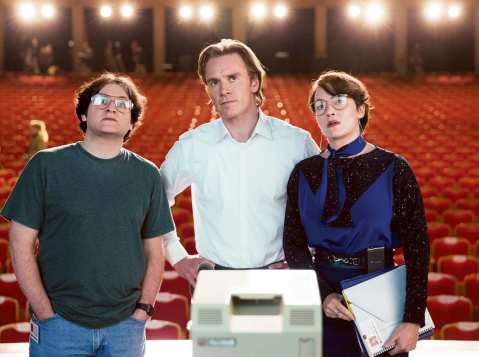
Aaron Sorkin returns with his third biopic of this decade, again returning to the digital world after he won his Oscar for The Social Network, and although with hindsight of late viewing, Steve Jobs was definite Oscar bait (only though for acting talent of Fassbender and Winslet). The award fame the film did gain was Golden Globes for Winslet and Sorkin and a BAFTA for Winslet to. But to back track to look at the films building blocks, as accustomed for Sorkin we get an elite director to guide his screenplays, here in the form of Danny Boyle, who’s last appearance with Trance left both audience and critic’s confused and ultimately disappointed. So what better way to re-enter critical appeal with a biopic, a genre known for its ‘purpose’ of being critical and award bait. Additionally, what made the film stand out was Sorkins limited scope for the film, regarding to his three acts setting, and although this may sound like a claustrophobic challenge, it appeared to play to Sorkin strength of fast paced fiery dialogue nature. For many this may be a disappointment as it fails to give a large overall insight as to how Apple (to the desired biographical extent) as The Social Network did and captivated audiences.
So straight of the bat to address Sorkin’s contribution of the film, this is the most ‘entertaining’ screenplay he has made. In particular, regards to the script here, which is the films foundation, he has created a symphony of crazy paced intelligent and gripping dialogue. The script manages grips audience in the same surprising nature that Whiplish final act does (not quite to the same memorable quality), to depicts the stress of backstage antics perfectly while also effectively intertwining the more emotive parts of the plot. There are some issues though, some dialogue may go over the heads of some audience members as they struggle with the speedy pace of the film. Also it does fall into the traps of most biopics of late being that with the very direct and blunt way in which it delivers the emotive aspects of the film, explaining each emotion to the audience isn’t always needed. And although this blunt technique is brilliant (really brilliant) for the plot points not connecting to family, the more personal emotive sets are rather lacking in subtly to the drama, for some this may be perfect, others slightly spoon fed. For this reason, it still functions as ever so slightly generic biopic material, but thankfully its generically perfect to take itself up a level.
Now for the under rated aspect of the film, Boyle’s contribution, for a director who is no stranger to the limited claustrophobic set, with the chillingly shot 127 Hours, it is a joy to be reminded of his talent. In many regards his work complimented the music score of Daniel Pemberton (a little known composer who has brought great added tone to films such as The Awakening and The Counsellor) to create a film that delivered Sorkins script in a way to create this enthralling orchestrated drama piece, they match was made for each other. The gripping following story within a limited time was slightly reminiscent of Birdman, of course not as memorable due to a failure to shake off a generic biopic aura. Alike the script, some of Boyle’s shot types can drift into obviously emotive ground, overall Boyle was very inventive with both his own additions to the film, presentation of the crowd was an effective tension builder, as well as the structure of Sorkin’ set poignant pieces, particular an address to the team before they escape from him into an elevator as he barks instructions, which uses has the one shot feel that was maintained in Birdman to create a great level of realism to the scene.
For the acting force in the film, before the heavy hitter are addressed in the film, there was a surprise gems across the supporting cast, a needed addition to the film, as many biopics fail in placing to much of the acting prowess within the lead characters. These other performances made the film much richer and gave Fassbender abusive Jobs a sense of reality as other actors reacted to it with such a high standard, a recent biopic that could have used this was Trumbo, also bait this past awards season. Out of all of the supporting; Seth Rogen, Jeff Daniels, Katherine Waterston, it was Michael Stuhlbarg who was most notable. Despite his very limited screen time and slightly type cast nature, Stuhlbarg embodied the little man under the pressure of the Jobs titan to an extent that had great chemistry, particularly in the final act, with his experience in nervous mannerisms and down-trodden acting abilities gained from other roles where on top form for this role. Personally Fassbender turned in a better performance than Winslet, but both actors in another year (with 2016 having huge acting talent across all categories) could quiet easily have taken home all the statues.
Steve Jobs is the biopic of the year by many a mile, but isn’t enough of a game changer to gain all the award success that it could have done. Sorkin has delivered his probably least realistic (as the dialogue sometime feels more staged for effect) but most invigorating script within the decade, you can definitely see the slightly cliché nature of A Few Good Men slipping into his recent sophisticated style. Regardless he has anchored himself as the best repeat offender of the true story genre within this decade (across all film making aspects) with an amazing trilogy of contribution with five years. And Fassbender has gone from strength to strength, having come a long way from breakout performance Hunger typified with 2015 being his strongest year with this film as well as lead in Macbeth (one of the strongest Shakespeare films to date). Fans of Sorkin will not be disappointed by this film despite its flaws, which can be summarised as the following. Sorkin was ambitions with his choice of the three act setting, but with making screenplays half come from script and half from the acting advice, set pieces and general scene construction. With a limiting setting you get a tunnelled screenplay and a miss on the rich set situations that made were present in Moneyball and The Social Network.
Verdict : Whatever genre falls or story issues that exists here, Steve Jobs is irresistible as an insightful and gripping drama. Sorkin has pulled it off again, but this isn’t a a one man show as the title suggest, across the filming making board, high standard.
Verdict : 4/5
Quote : “I’m gonna put music in your pocket.”
Mini review: Freeheld
Year: 2015
Certificate: 15
Director: Peter Sollett
Screenwriter: Ron Nyswaner
Cast: Julianne Moore, Ellen Page, Michael Shannon, Steve Carell
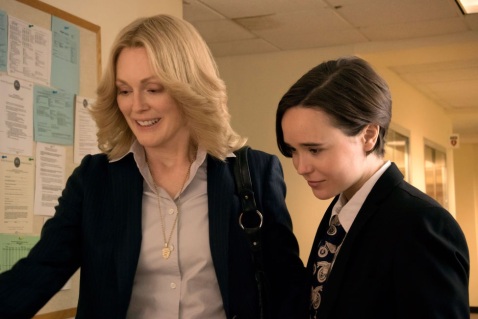
Julianne Moore stars as Laurel Hester, whose struggle to transfer her police pension to her partner Stacie Andree (Ellen Page) in the wake of Laurel’s terminal cancer diagnosis had a lasting impact on gay rights in the States. Despite excellent central performances from Page and Moore, the by-the-numbers screenplay and straightforward direction leave Freeheld feeling ultimately televisual. Frustratingly, the civil rights element and domestic drama element seem to jostle for position, each ultimately undermining the other as Laurel and Stacie’s relationship is not allowed sufficient screen time before the cancer diagnosis and subsequent legal struggle (with the supporting characters it brings in) become the central focus of the narrative.
Verdict: 3/5
Image: Fandango.com
BFI Flare review: The Girl King
Year: 2015
Certificate: 15
Director: Mika Kaurismäki
Screenwriter: Michel Mark Bouchard
Cast: Malin Buska, Sarah Gadon, Michael Nyqvist, Patrick Bauchau
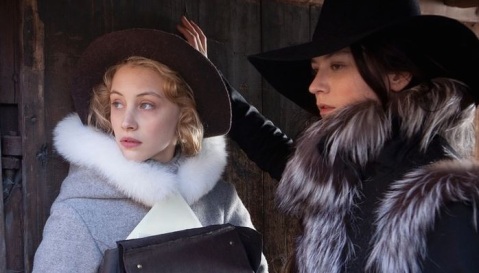 Amid the Catholic-Protestant conflict raging throughout 17th century Europe, Kristina (Malin Buska), only child of the late King Gustav II of Sweden, is raised under the watchful eyes of Sweden’s Lutheran court and it’s chancellor, Axel Oxenstierna (Michael Nyqvist). However, when Kristina comes of age and begins to rule as queen, her* radical proclamations and unconventional conduct in private cause tensions within the court.
Amid the Catholic-Protestant conflict raging throughout 17th century Europe, Kristina (Malin Buska), only child of the late King Gustav II of Sweden, is raised under the watchful eyes of Sweden’s Lutheran court and it’s chancellor, Axel Oxenstierna (Michael Nyqvist). However, when Kristina comes of age and begins to rule as queen, her* radical proclamations and unconventional conduct in private cause tensions within the court.
A Sweden-Canada co-production, The Girl King is a valiant if ultimately flawed attempt to illustrate the life of an extremely unusual monarch. Buska, already a well-known theatrical actress in Sweden, is a perfect choice for the intelligent and rakish Kristina, and is a commanding screen presence. However, one can’t help wonder if she is being held back slightly by the requirements of performing in a second language (other than the occasional exchange in French, the film is spoken in English), as her delivery of the lines doesn’t quite equal the exquisite subtlety of her facial expressions. Michael Nyqvist (known for the Swedish Girl With the Dragon Tattoo trilogy) does admirable work here as Sweden’s Chancellor, showing a surprising deftness in the more comic moments. The exchanges between Axel and Kristina, particularly when he is trying to delicately approach the subject of her tomboyish nature, are some of the best scenes in the film. Other highlights are Sarah Gadon as Kristina’s love interest, Countess Ebba Sparre, and Patrick Bauchau as the French philosopher René Descartes, with whom Kristina strikes up a correspondence which scandalises the pious members of her court (while Sweden and France had a mutual enemy in Germany, France’s allegiance to the Pope made their truce an uneasy one).
Despite the quality of the acting and some clever cinematography courtesy of Guy Dufaux, The Girl King ultimately feels a little ramshackle. Bouchard’s screenplay makes much of Kristina’s love for Ebba, and while it’s refreshing to see such an unapologetically queer historical figure pursuing their desires, the arc of Kristina and Ebba’s romance feels clichéd and despite an elegant turn from Gadon as a character Ebba is paper-thin. Indeed, even Kristina’s crisis of faith- surely hugely important for her as a character- feels glossed over here, and this lack of achievement of the script in really getting under her skin leaves the whole piece feeling too light. This, coupled with the slightly uneven tone where moments of high camp sit uncomfortably next to overwrought emotional scenes, serves to eject the audience from the narrative. A few moments of sloppy editing further underscore these problems.
All in all The Girl King feels like a film which is punching below its weight somewhat. However, there is still much to like here, particularly given the dearth of LGBT historical figures represented on screen. The narrative holds together well enough to showcase the film’s stronger components, and if this is Malin Buska’s Hollywood calling card she will certainly be one to watch in the future.
Verdict: 3/5
BFI Flare is the British Film Institute’s annual LGBT film festival in London. More information about the festival can be found here.
*A note on pronouns: in terms of the historical record, there seems to be a fair amount of debate between academics over both Kristina’s gender and sexuality, with varied theories suggesting Kristina may have been any one of what we now know as gay, bisexual, transgender or intersex. As there is little historical consensus on this, and as the film portrays her fairly unwaveringly as a cis lesbian, I have used female pronouns in my review. If this is a problem let me know and I can edit to gender neutral. Many thanks to my historian friend Katie for doing some academic investigation into Kristina’s history.
Image credit: facebook.com/TheGirlKingFilm
Chappie DVD Review
RoboCop
Released : March 6th 2015
Certificate : 15
Director : Neill Blomkamp
Cast : Sharlto Copley, Hugh Jackman, Dev Patel, Yolandi Visser, Watkin Tudor Jones, Sigourney Weaver
Plot : South Africa has become the leading county for crime fighting, as the chaotic gang crime and high murder rates have been tamed by a division of robotic police force. But conflict ensues when the creator of the robots (Dev Patel) gifts one robot with a coded consciousness.
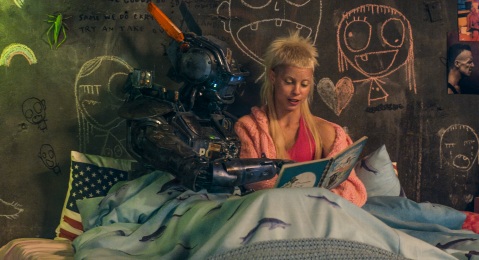
Neill Blomkamp returns for his third South African based violent sci-fi flick, and this time its more South African than very before, as joining the South African talent Sharlto Copley (present in all three Blomkamp outings) is now South African rap duo Die Antwoord, staring and generating the soundtrack of the film (along with the help of Hans Zimmer) . For this feature, since Blomkamp has dealt with aliens, and spaceships, he now rests his sights on robots and artificial intelligence, with a script he has written (as he did with Elysium and District 9). With his third film the promises of talnet that were earned with Best Picture nominionee District 9 are still present, despite the modest critical reception of Elysium which was deemed to be lacking in the creativity and heart that its predecessor had. Perhaps the complex plot point that come with aritifical intelligence be ale to bring back some level of heart, to balance out Bloomkamp reliance for big cgi effects and extensiveness violent action sequences to allow for a film of better praise by critics who are looking for more than the average sci-fi shoot em up film type, despite the gripping and skillfully nature behind many of these films.
To address Blomkamps writing for this feature, which was completed with the help of co-writer Terri Tatchell, who also co-wrote District 9, there is undeniable aspects for dispute. This isn’t held within the largely 2d supporting characters (tipified by the villains of Blomkapms films) but more the set of a generic formula of the film. Despite the creative settings that both Elyusim and Chappie presented, there is the obvious generic rivalry in the film, you can see from the opening who is pitted against who and that the film for all of its development will boil down to and extravagant (all be it entertaining) closing action sequence. Good vs evil which is set up and set in a predictable direction to pay off for the big scale crash and bash (not that this isn’t well done, but makes for an uninventive story, rapped up in inventive premise). Secondly to this is and ending that may have outreached the bounds of imagination for many audience members, despite it being for the reason to make a profound ending to the film (bringing in some of that heart) it does so with a stretch too far, even for the world of sci-fi.
But for the positive attributes of Blomkamps, it is a joy to see his trade marks return to the screen, with noticeable trade marks making as repetitive (in a good stylistic way) as Zac Synder, but for sci-fi. Blomkamps iconography is as always, brilliant and beautiful, helped by the addition of Trent Opaloch, cinematographer for Blomkamps previous films (as well as the equally visually stunning Captain America: Winter Solider). There work together helps to create worlds and characters that are truly a visual feast that are underrated in this respect, as are the action sequences they produce which due to their bloody nature with Blomkamp get slightly smeared. This is what makes Blomkamp much more alike Zac Synder than Michael Bay, for his signature trade mark visual nature to his films. With this in mind as to the artful choreography of his action scenes, Chappie is lacking in them in comparison to Blomkamps previous work, making for a film with a slight lack of pace in some scenes, but doesn’t lose their visual appeal with a strong opening and closing display of bullets flying. Although it could easily be argued that like Synder, there is sometimes a tendency to rely on slow motion action too frequently.
As for the acting talent on offer, we have a voice performance by Sharlto Copley, making for an odd but effective robot with a South Africa accent, a very brutish and 2d Hugh Jackman as the badie veteran, and the interesting addition of a rap duo trying their chops at acting. Copley is able to create more of an interesting character than previously in Elysium, as he was burdened with the 2d villain role (which he performed with impressive conviction, but ultimately wasted on the character), how much of the voice was genuine or altered in post production is unknown but the end effect is impressive. To a large degree Yolandi Visser and Watkin Tudor Jones suit their roles like a glove, due to a degree them playing watered down versions of their on stage music personas, odd ball and gangster. Helping to create a ‘family’ dynamic with Chappie that is convincing and brings a level of emotion and conviction which is surprising for rap artists, and the addition of their songs in the sound track suit every aspect of the film pitch perfectly. The addition of Dev Partel is good type casting as is Hugh Jackmen, to embody the nerdy moral aware programmer and the hard headed ruthless solider, hence the actors are sutied to their roles to make performances with good conviction and help to anchor the beautiful and believable world created by Blomkamp and Opaloch.
Unfortunately it might have to be said that Chappie is the worst of Blomkamps sci-fi trilogy, but this doesn’t change it from being a Blomkamp film, and that means there is an inherent high quality, it just dropped a bit for this installment. The main falling point of this film is the potential that comes with the artificial intelligence genre and the interesting concepts that this holds, and why the film quickly and early finds direction, the final third loses it self in a generic good versus evil followed by an slightly outlandish stab at a profound ending. But along the way the audience will be rewarded with laughs, thrills and awe of Blomkamps eye for making the cgi effects artistic rather than gratuitous, this with his continuing imagination maintains him as one of the leading lights of the sci-fi genre. He will continually suffer from his first outing be so strong and everything being compared to this, but Chappie is by no means anything close to a bomb, just not as unique as the premise and director/writer could have been. A thrilling outing that may not be as memorable, but is a fast burning rush, that might stumble at the final hurdle, but this doesn’t smear the overall experience.
Verdict : No sci-fi classic, but its a tasteful rehash of old genre concepts and Blomkamps finger prints are all over it, making it an cut above the rest of yearly sci-fi entries.
Verdict : 3/5
Quote : “Why did you build me to die maker?”
Mini review: Deadpool
Year: 2016
Certificate: 15
Director: Tim Miller
Screenwriters: Rhett Reese, Paul Wernick
Cast: Ryan Reynolds, Morena Baccarin, Ed Skrein, TJ Miller, Gina Carano, Karan Soni, Brianna Hildebrand, Stefan Kapicic
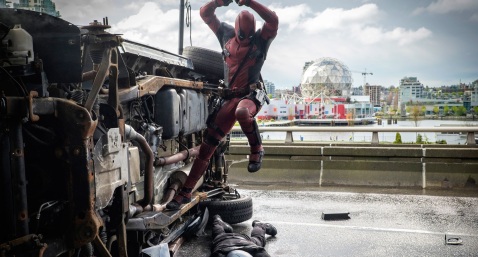
Ryan Reynolds finally finds his metier as Wade Wilson, a smart-mouthed thug for hire turned superhuman on the hunt for revenge against the man who tortured and disfigured him. Fast-paced, sharp and hyperbolically violent, Deadpool explodes out of the gate with a slow-mo car-crash fight sequence set to the strains of Juice Newton’s Angel of the Morning, and proceeds to flash back, forwards and sideways to fill in the recent history of its vengeful protagonist. Reynolds- who, despite his considerable aptitude as an actor, has heretofore been pushed from pillar to post in Hollywood- is a revelation here, his physicality and voice acting adding up to a magnetic performance underneath Deadpool’s bright red and black mask. Director Tim Miller does an admirable job of keeping a firm hand on the tiller while driving the action forward at such a pace that it’s easy not to notice until afterwards how generic the story actually is. Disappointingly, despite Deadpool’s eagerness to poke fun at the foibles of superhero movies (quips about green spandex and the straight-lacedness of the X-Men abound), it makes little effort to subvert that genre’s underlying tropes. A case in point is Wade’s girlfriend Vanessa (Morenna Baccarin), whose ‘dream girl/ damsel in distress/ prize for the hero’ story arc couldn’t be more clichéd, a fact not quite remedied by her sharp tongue and Baccarin’s admittedly strong performance.
Verdict: 4/5
Image credit: foxmovies.com
Review: Room
Year: 2015
Certificate: 15
Director: Lenny Abrahamson
Screenwriter: Emma Donoghue
Cast: Brie Larson, Jacob Tremblay, Sean Bridgers, Joan Allen, Tom McCamus
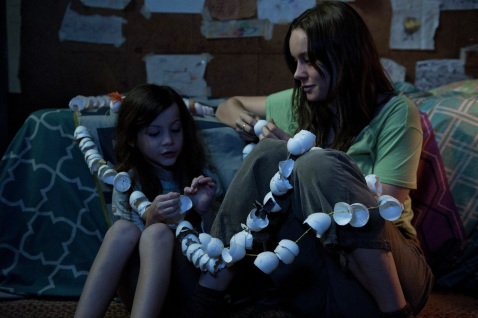
Jack (Jacob Tremblay) is five and he lives with Ma (Brie Larson) in Room, a situation which as far as he is concerned is completely normal. But when Jack turns five, Ma begins to tell him about the world outside of Room, and how she and Jack came to live- as prisoners- inside it.
Lenny Abrahamson’s powerful adaptation of Emma Donoghue’s equally powerful 2010 novel is an account of an unspeakably awful crime told through the eyes of a five-year old child. Jack’s voiceover narration orientates us within his life: he tells us what is real (lamp and light-switch) and what is not (trees), but as the camera bounces around the walls of Jack’s home, this cheerful description is at odds with the grotty and claustrophobic enclosure where Jack and his mother have been forced to live by Ma’s kidnapper (Sean Bridgers), known only to Jack as Old Nick. Room is an example of how truly harrowing subject matter can be discussed in a way which exhibits the full horror of the situation without ever being gratuitous. Seeing through Jack’s eyes softens the hard edges of the story as he absorbs everything with the equanimity of childhood. Having been born in room, he has never known things to be any different.
The impressive achievement of creating a film that deals with terrible circumstances honestly but without voyeurism is in large part due to the extraordinary performances of the two leads. Larson, who is most often seen brightening up daft Hollywood comedies but who delivered an absolutely astonishing lead turn in 2013’s Short Term 12, commands the screen as Ma. Her performance is so communicative that the camera does not need to provide an explicit description of what is done to her- it is evident in her every move and facial expression, and in her interactions with Jack. Ma is torn between the need to protect him and the desire to liberate them both, knowing that in order to do so she must force the knowledge of Jack’s incarceration upon him. Newcomer Jacob Tremblay, too, is a remarkable find, and the mother-son bond between the two characters is utterly believable. Tremblay comes into his own in the latter half of the film, brilliantly communicating Jack’s reaction to changing circumstances and an evolving relationship with Ma.
Emma Donoghue’s screenplay is an elegant distillation of the novel which maintains the effect of telling the story from Jack’s perspective (the novel is entirely written in the first person) without the overuse of the device of voiceover. A downside of the inherently visual medium of film is that the initial gradual reveal of the reality of Jack and Ma’s situation which is a strong (and devastating) element of the book cannot be preserved here. Furthermore Abrahamson, while clearly an expert at getting excellent performances from his actors, has a rather straightforward visual style. However, Danny Cohen’s cinematography is not without some flair. The camera initially bounces around, reflecting Jack’s innocence and childish energy, but becomes increasingly static as his understanding of his situation increases. Another (perhaps unavoidable) weakness is the occurrence of an emotional crescendo around the midpoint that, while allowing the narrative to shift into something more subtle that might be suggested by the film’s first act, also unbalances the pacing slightly, at times making the second half feel overlong.
Despite these reservations it’s hard to see how a better adaptation could have been made. Although at times an extremely touch watch, the story is told with such emotional sensitivity and such perfect performances that it transcends it’s headline-grabbing start point to access something altogether deeper and more affecting.
Verdict: 4/5
Image credit: aceshowbiz.com
Bridge of Spies Review
Saving Private Rylance
Released : December 26th 2015
Certificate : 12A
Director : Steven Spielberg
Cast : Tom Hanks, Mark Rylance, Amy Ryan, Billy Magnussen, Austin Stowell, Sebastian Koch
Plot : During the Cold War, Russian spy Rudolf Abel (Rylance) is arrested by the american government. In an attempt to give him the appearance of a fair trial, James Donovan (Hanks) is assigned to defend him. Matters are complicated when american pilot Francis Gary Powers (Stowell) is shot down and captured by the Russians.
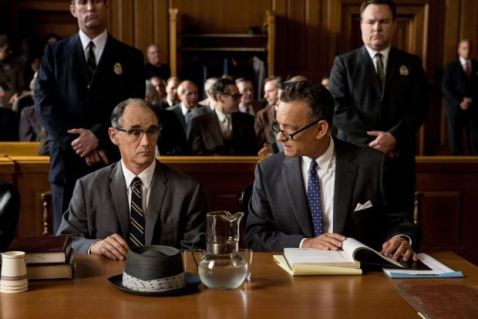
Yet another leading film this award session, and as time passes, predictions can quiet easily be made about the Oscars with the influence of the passing two award ceremonies. The award this film acquired at the recent BAFTA’s was that of best supporting actor to Mark Rylance (awarded before I saw the film) for his portrayal of Russian spy Rudolf Abel who seems surprisingly calm during his trial. The film also brings Steven Spielberg back to into award nominations, with last entry being Lincoln. A general critical response seems to be that we can be inclined to take such well-established directors work for granted. And that Bridge of Spies has reminded us of his skill of the craft, which we still need to appreciate, even with a routine fourteen academy award nominations, winning three of these. A true Meryl Streep of the directing world. And Bridge of Spies partners him again with Tom Hanks in a film studying patriotism, justice and humanity. But a less talked about and my surprising aspect of the film is that of the involvement of the Coen brothers. They being the two who wrote the films original screenplay, adding to the films nomination categories.
As far as this writing and the story it creates, it results in very classical cinema. This isn’t using the term in relation to it being of a very high standard, but rather due to its attitude to subject matter. With a plot with little morality to divide (as most war film do divide) and minimal character development, but furthermore the tendency to dramatics (overly for some) topics of patriotism and justice. It gives the film a squarer and more ununique take, with vibes relying on drama as seen before in Stevens films such as Lincoln and War Horse. This does makes the film perfect material for Steven to create specific atmospheres, but there is lack of capitalisation in some areas of the film. It is a surprising screenplay to come from the Coens, and it very much has a sole purpose in the narrative meaning, lucky that meaning will be a crowd pleasure. The film will leave audience happy as it’s a punch the air tale about doing the right thing. But Steven could have capitalised more on the tension particularly within the climax of the film, tension being a different atmosphere to drama. As an audience member there was little doubt in my mind that their would be a happy ending, the film could have attempted to sway audience more.
Steven however is masterful at building and instilling the warm message the film has into the cold world of Berlin, and immersing the audience into that world. While the film won’t generate relatability with the population of america, but Steven does manage to construct great work within Berlin, showing off his scene management with panning shots down along the building of the Berlin wall being noteworthy. Another effect which was refreshing to see again is his ability to manage action sequence, which was lacking in his recent instalments. Despite it being just one scene of a plain crash, it looks stunning and worth several of many other films action scenes. This along with other subtle effects, despite the films reliance on dialogue (always difficult to add to directing wise), shows Steven great skill. Not necessarily for new shots or for atmospherical creation, and other aspects like the obvious choices to construct certain scenes is probably the main reason why he will be missing out for the directing award nomination, doesn’t make his work any less tasteful. To conclude on Steven’s contribution, this film feels very much like a perfection of his art form of the good willed dramatic war story, varnished over War Horse and Lincoln.
Now to address the acting, which this side of the film is carried by Hanks and Rylance. This doesn’t imply that there isn’t other acting talent involved, but the other characters feel more 2D and serve to compliment the works of Hanks and Rylance. Gaining higher status with a brilliant performance in Wolf Hall after a career devoted mostly to stage, he follows it with a minor role in The Gunman and now this, earning him his first film acting award. This was a dark horse for many of the awards session due to the fact that in comparison it is the most subtle performance probably across all acting categories. This due to the characters lack of extreme emotion displayed or inner conflict within the character, this is a performance gaining praise solely through conviction and believability and rightfully so. While Stallone might still be the favourite, the acting in the sporting role categories is looking the hardest to call at this point. As Rylance differed himself from Hanks in this film via the pure deliverer of lines, Hanks to a degree still felt scripted, while Rylance didn’t. In many ways the end goal of an acting, to distinguish a script within a genuine character.
Bridge of Spies doesn’t bring anything new to the table within its genre, story or directing. But all long with the acting are executed to such a fine quality that it doesn’t matter. It is without a doubt that many may watch B of S and find it to be rather cliché in scenes that attempted to be more poignant than they are (the hyperbole reaction of the american government and people being a main one), but its impossible not to enjoy this film good natured tale. This being a tale fuelled with talent across the board as far as writing, directing and acting meaning that these cliché frameworks are more than welcome on screen within such good hands. Another brilliant and memorable collaboration between Hanks and Spielberg in a film with style and motive no stranger to either, but lucky the quality outshines any repetitiveness. S of B is well written, brilliant directed and superbly acting (thanks to Rylance), but in a year of unique cinema, only one Oscar is likely for this film.
Verdict : Steven has created his most enjoyable film since Catch Me If You Can, while the film could have had a different vibe within another directors hands, Steven’s were good enough. Rylance now has a career in film as a true character actor.
Verdict : 4/5
Quote : “And don’t nod at me like that you son of a bitch.”
Recent Posts
Archives
- September 2017
- February 2017
- January 2017
- November 2016
- October 2016
- September 2016
- June 2016
- April 2016
- March 2016
- February 2016
- January 2016
- December 2015
- November 2015
- October 2015
- September 2015
- August 2015
- July 2015
- June 2015
- May 2015
- April 2015
- March 2015
- February 2015
- January 2015
- December 2014
- November 2014
- October 2014
- September 2014
- August 2014
- July 2014
- June 2014
- May 2014
- April 2014
- March 2014
- February 2014
- January 2014
- December 2013
- November 2013
- October 2013
Categories
- 1961
- 1982
- 1985
- 2010
- 2011
- 2012
- 2013
- 2014
- 2015
- 2016
- 2017
- 2D
- 3D
- Cinema
- Classic Reviews
- Collections
- DVD
- films
- Genre: action
- Genre: animation
- Genre: biopic
- Genre: comedy
- Genre: drama
- Genre: fantasy
- Genre: horror
- Genre: LGBTQ
- Genre: musical
- Genre: period drama
- Genre: sci-fi
- Genre: superheroes
- Genre: thriller
- Genre: western
- Netflix
- Preview Article
- Rating: 1/5
- Rating: 2/5
- Rating: 3/5
- Rating: 4/5
- Rating: 5/5
- Reviewed by: AES
- Reviewed by: SO
- Reviews
- Top 5 List
- Uncategorized
Recent Comments